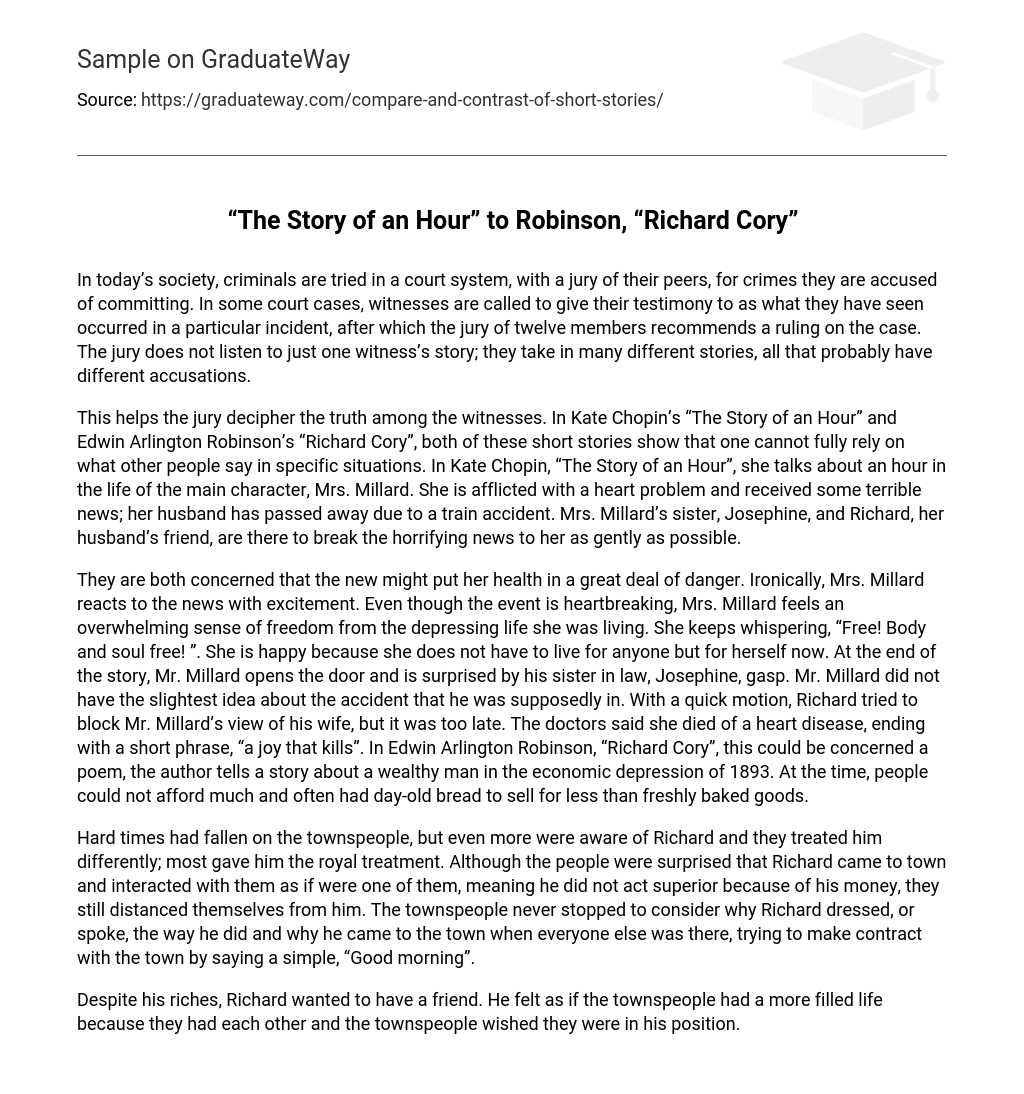In today’s society, criminals are taken to court and judged by a jury made up of their fellow citizens. In these legal proceedings, witnesses are called upon to give testimony regarding a particular incident they observed. Afterward, the twelve jurors discuss and present their suggested verdict on the matter. It is worth mentioning that the jury does not solely rely on one witness’s account but rather considers several testimonies, each possibly containing different accusations.
This text highlights the importance of determining the truth from witnesses in the jury. It demonstrates this through Kate Chopin’s “The Story of an Hour” and Edwin Arlington Robinson’s “Richard Cory” short stories. In “The Story of an Hour,” Chopin explores a particular hour in the life of Mrs. Millard, the main character, who suffers from a heart condition. After she receives devastating news that her husband died in a train accident, her sister Josephine and Richard, her husband’s friend, cautiously inform her.
Both concerned, they worry that the news could pose a serious threat to her health. Ironically, Mrs. Millard reacts to the news with excitement, despite its heartbreaking nature. She experiences a profound sense of liberation from the bleak existence she had been living, repeatedly whispering, “Free! Body and soul free!” Her happiness stems from no longer having to live for anyone but herself. In the story’s conclusion, Mr. Millard opens the door and is taken aback by his sister-in-law Josephine’s shocked gasp. Unaware of the accident he was supposedly involved in, Mr. Millard is caught off guard. Richard attempts to swiftly block Mr. Millard’s view of his wife, but it proves futile. The doctors attribute her cause of death to heart disease, ending with the phrase “a joy that kills”. Edwin Arlington Robinson’s poem “Richard Cory” is reminiscent of this narrative, as it depicts a wealthy man during the economic depression of 1893 when people struggled to afford basic necessities and resorted to selling day-old bread at a lower price than freshly baked goods.
Despite the hard times that befell the townspeople, they treated Richard differently, giving him the utmost respect. Although they were surprised that Richard mingled with them as equals, not flaunting his wealth, they still kept their distance. The townspeople didn’t take the time to understand Richard’s appearance, speech, or his decision to visit the town while everyone else was trying to make business connections through simple greetings like “Good morning.”
Despite his wealth, Richard longed for companionship. He envied the townspeople, who seemed to lead fulfilled lives by having each other, and they, in turn, wished they were in his position. As the short story progresses, the reader becomes increasingly aware of Richard’s profound loneliness. In a desperate attempt to alleviate the pain, he tragically ends his own life by shooting himself. All he truly desired was a friend. In “The Story of an Hour,” Mrs. Mallard’s knowledge of her husband’s death is solely based on what her sister Josephine has told her. Once Josephine informs her, Mrs.
Mallard barricades herself in her room and sheds tears upon discovering that her husband is alive. Instead of solely relying on one report, Mrs. Mallard could have confirmed the information with other sources like Josephine, her sister. By neglecting to do so, Mrs. Mallard isolates herself and depends on incomplete facts. This does not imply that Josephine is unreliable; she may just be unaware of all the details. Therefore, it would benefit Mrs. Mallard to consider different perspectives to determine the truth.
The poem “Richard Cory” leaves the reader uncertain about the events that occur. The information presented is based solely on the accounts of the townspeople. According to them, Richard Cory goes home and shoots himself in the head. This suggests that he may have taken his own life, but it cannot be confirmed. As the reader lacks knowledge about Richard’s emotions in the poem, no assumptions can be made. The townspeople, who do not personally know Richard, are not completely trustworthy sources. Their knowledge about him is limited to his wealth and presumed well-being. Consequently, the reader is left unaware of the fate of poor Richard Cory, due to the unreliable nature of the townspeople’s testimony.





